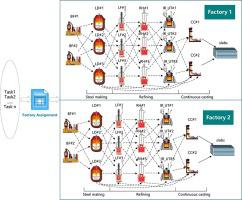Computers & Operations Research ( IF 4.1 ) Pub Date : 2021-07-22 , DOI: 10.1016/j.cor.2021.105482 Weishi Shao 1, 2 , Zhongshi Shao 3 , Dechang Pi 2, 4

|
The distributed shop scheduling has gained a great deal of attention due to its high-efficient collaboration and production. This paper studies a distributed no-wait flexible flow shop scheduling problem (DNWFFSP) with the makespan criterion, where each factory includes an identical flexible flow shop with no-wait constraint that requires each job to be processed without any waiting time between consecutive stages. A mixed-integer linear programming model for the DNWFFSP is presented. A machine selection method based on the first earliest available machine rule is presented. Three greedy factory assignment rules incorporating NEH (Nawaz-Enscore-Ham) heuristic are developed to allocate jobs into factories. Fourteen dispatch rules involving simple sorting and decomposition method are developed to construct a priority sequence of jobs. Thus, several constructive heuristics are obtained by combining dispatch rules and factory assignment rules. Furthermore, a constructive heuristic version of variable neighborhood descend is designed to address the DNWFFSP. One of constructive heuristics is selected to generate an initial solution, and five neighborhood search methods are used as the local search procedure. A comprehensive numerical comparison and statistical analysis are carried out to investigate the performance of the proposed approaches. The distributed NEH2 with smallest largest-medium rule obtains better results than other constructive heuristics for large-size instances.
中文翻译:

分布式无等待柔性流水车间调度问题的有效构造启发式
分布式车间调度因其高效的协同生产而备受关注。本文研究了一个分布式无等待柔性流水车间调度问题 (DNWFFSP),其中每个工厂都包括一个相同的柔性流水车间,具有无等待约束,要求每个作业的处理在连续阶段之间没有任何等待时间。提出了 DNWFFSP 的混合整数线性规划模型。提出了一种基于最早可用机器规则的机器选择方法。开发了三个结合 NEH(Nawaz-Enscore-Ham)启发式的贪婪工厂分配规则来将工作分配到工厂。开发了十四个涉及简单排序和分解方法的调度规则来构建作业的优先级序列。因此,通过结合调度规则和工厂分配规则,获得了几个建设性的启发式方法。此外,变量邻域下降的建设性启发式版本旨在解决 DNWFFSP。选择一种建设性启发式方法来生成初始解决方案,并使用五种邻域搜索方法作为局部搜索程序。进行了全面的数值比较和统计分析,以研究所提出方法的性能。对于大型实例,具有最小最大中规则的分布式 NEH2 比其他构造启发式获得更好的结果。选择一种建设性启发式方法来生成初始解决方案,并使用五种邻域搜索方法作为局部搜索程序。进行了全面的数值比较和统计分析,以研究所提出方法的性能。对于大型实例,具有最小最大中规则的分布式 NEH2 比其他构造启发式获得更好的结果。选择一种建设性启发式方法来生成初始解决方案,并使用五种邻域搜索方法作为局部搜索程序。进行了全面的数值比较和统计分析,以研究所提出方法的性能。对于大型实例,具有最小最大中规则的分布式 NEH2 比其他构造启发式获得更好的结果。











































 京公网安备 11010802027423号
京公网安备 11010802027423号